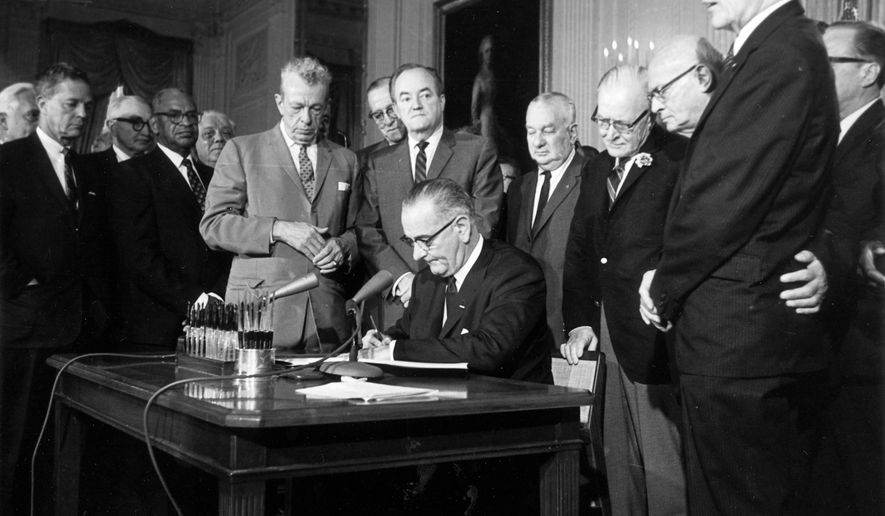OPINION:
Are American politics an irresistible target for Russian interference? As special counsel Robert M. Muller III winds down his investigation, the question of possible election meddling in 2016 — direct or indirect — remains unresolved. But history suggests that such an attempt would not be the first such effort by Moscow.
In 1968, Vice President Hubert H. Humphrey, the Democratic candidate for president, was having severe campaign money problems. Heeding strong anti-war voices in his party, Mr. Humphrey showed signs of favoring a peace settlement in Vietnam that would have pulled the United States out of the war under terms unacceptable to incumbent Lyndon B. Johnson.
For those of us covering the campaign, President Johnson’s irritation with Mr. Humphrey was obvious. Although he had renounced an attempt for re-election, he would storm that “the Kennedy crowd got me into this war, and now they want to cut and run.” A fund-raiser of legendary renown, a frown from Johnson was enough to keep traditional big-buck Democratic donors from reaching into their pockets for Humphrey.
That Humphrey was short of money was obvious to anyone around his entourage. Struggling for enough cash to visit key states, his travels were limited. Perhaps more importantly, he was able to afford only minimal use of television — a medium which was commanding a significant role in a presidential campaign. By contrast, rival Richard M. Nixon was omnipresent on TV screens.
Humphrey’s defeat, of course, would have given the election to Nixon, a dedicated anti-Communist who had been anathema to the Russians throughout his career. Nixon made plain he would pursue stronger measures to end the war on more favorable terms.
One pledge was to stop the massive Soviet arms shipments that kept client North Vietnam in the war. In Nixon’s view, “the Russians are giving the communists the weapons with which they are killing American boys — and they are doing it with impunity.” He hinted that he would lift restrictions that prevented the Air Force from bombing Soviet vessels that steamed unmolested into North Vietnamese ports.
Among the persons alarmed by the military consequences of a Nixon victory was Anatoly Dobrynin, Soviet ambassador to Washington (1962-1981). A dedicated Communist, Mr. Dobrynin nonetheless managed to have tolerably civil relations with presidents from John Kennedy to Ronald Reagan. His position, naturally, required him to give objective assessments of political affairs.
His prediction of a possible Nixon victory caused consternation in the Kremlin. As he wrote in his memoir, “In Confidence,” published in 1995, “the top Soviet leaders took an extraordinary step, unprecedented in the history of Soviet-American relations, by offering Humphrey any conceivable help in his election campaign — including financial aid.”
Dobrynin wrote that he received a “top secret instruction to that effect” from Andrei Gromyko, the foreign minister. He continued that he “did my utmost” to dissuade him from embarking on such a dangerous venture, which of course if discovered certainly would have backfired and ensured Humphrey’s defeat, to say nothing of the real trouble it would have caused for Soviet-American relations.
“Gromyko answered laconically, ’There is a decision, you carry it out.’”
Soon thereafter, Dobyrnin was invited to Humphrey’s home for breakfast. (According to his memoir, Dobyrnin did a good deal of diplomatic business over meals with officials of both Republican and Democratic administrations.)
“Naturally, we talked about the election campaign, so I tried to take advantage of that to carry out my instructions as tactfully as possible. I asked him how the campaign was coming, and then I moved the conversation diplomatically to the state of his campaign finances.
“Humphrey, I must say, was not only a very intelligent but also a very clever man. He knew at once what was going on. He told me it was more than enough for him to have Moscow’s good wishes which he highly appreciated. The matter was thus settled to our mutual relief, never to be discussed again.”
As Dobyrnin related, “The Politboro always watched American politics closely for their potential effect on Soviet-American relations and usually had a preference but rarely expressed it or took sides by offering diplomatic or other help. To my knowledge, this was the only times Moscow tried to intervene directly to help a favored candidate — and it got nowhere.”
Dobyrnin related the fate of a Soviet ambassador in London who advised superiors in Moscow that “it would be safe to receive Prime Minister Harold Wilson for a pre-election visit.” A month later, Wilson “was turned out of office in a defeat widely regarded as an upset. For this imprudent piece of advice, the ambassador was relieved of his post.”
Dobrynin perhaps cites the demise of the London ambassador in expressing relief that Humphrey rejected the offer of Kremlin gold. He would continue in his post in Washington for 16 more years.
• Joseph C. Goulden was Washington bureau chief for the Philadelphia Inquirer for the last years of the Johnson presidency.




Please read our comment policy before commenting.